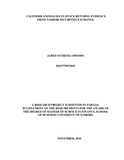| dc.description.abstract | The efficient market hypothesis postulates that security markets exhibit efficiency, consequently it is not possible to make abnormal returns by either following fundamental analysis or technical analysis. It assumes stock prices move randomly and therefore forecasting future stock prices using historical stock prices is unfeasible and returns are not significantly different from one day to another or from one month to another. However, based on calendar trading, it is feasible to earn inflated or reduced returns on certain days or in certain months. This research enquires into the subsistence of calendar anomalies, specifically the day of the week and the January effect in stock returns at Nairobi Securities Exchange. Three statistical models, OLS, symmetric GARCH (1, 1) and asymmetric EGARCH (1, 1) models have been employed to answer the objective of the study. The results from GARCH (1, 1) and EGARCH (1, 1) models confirm subsistence of the day of the week and the January effect in stock market returns at NSE. | en_US |



